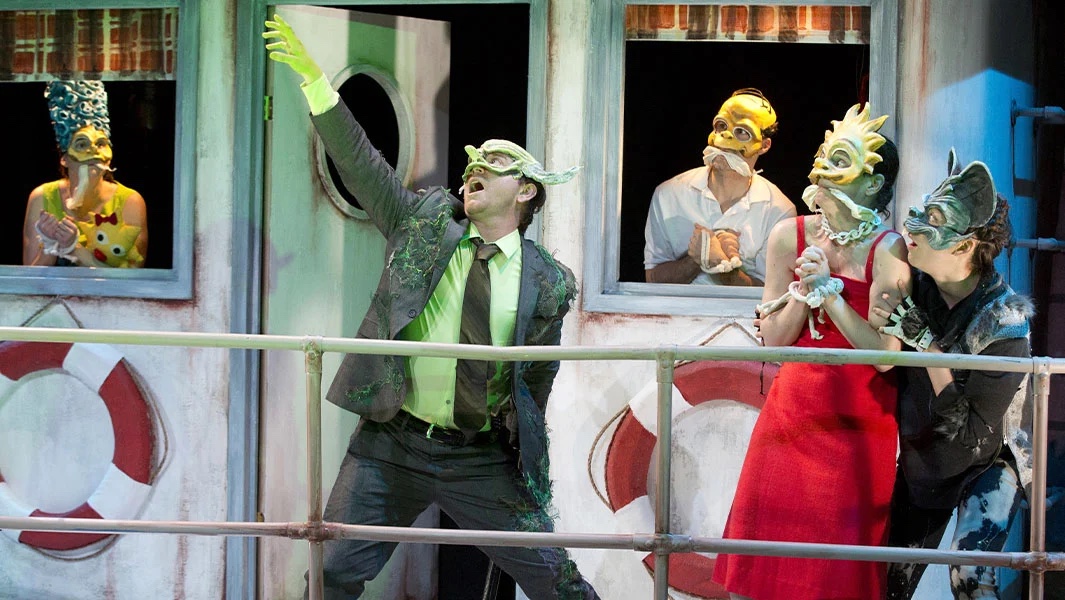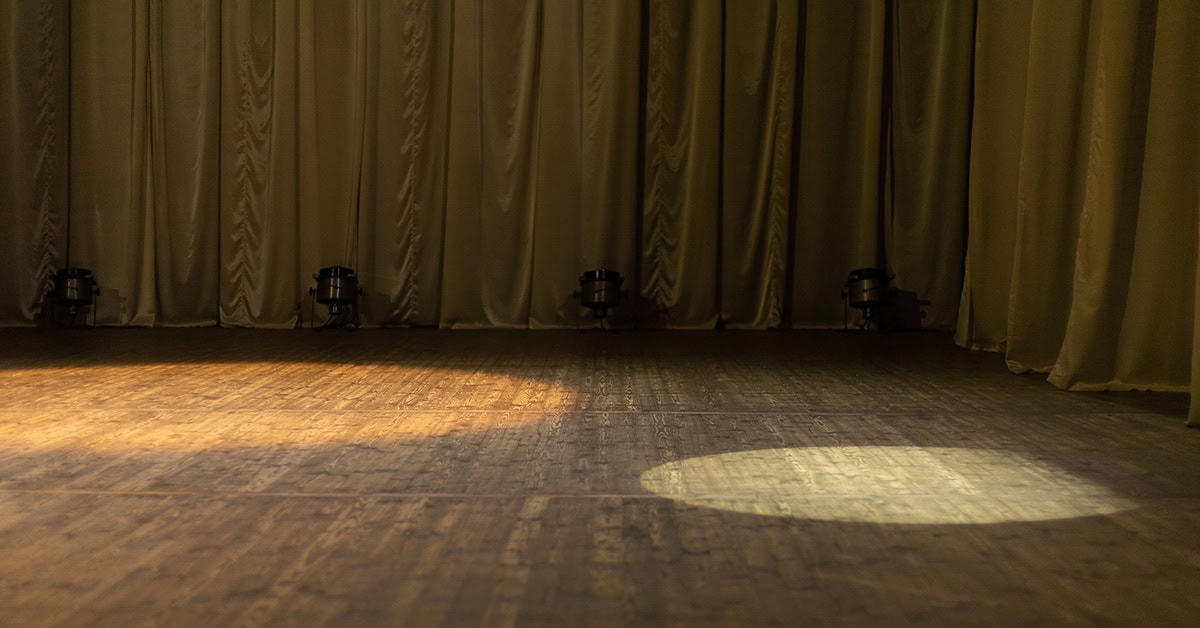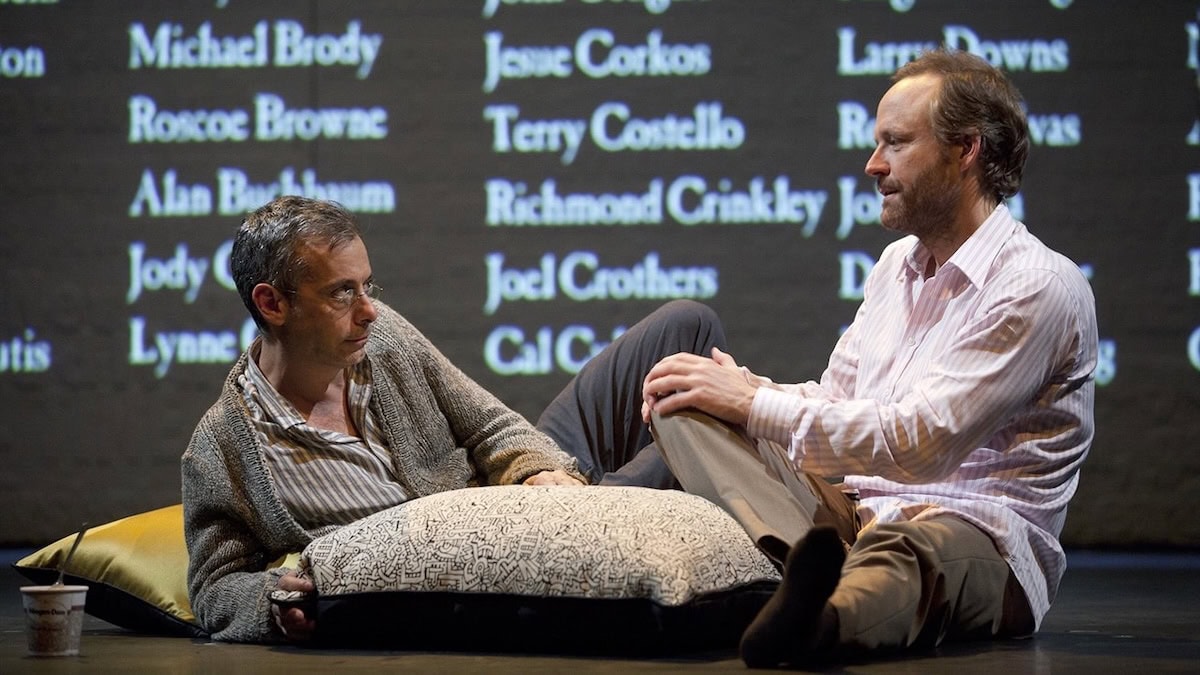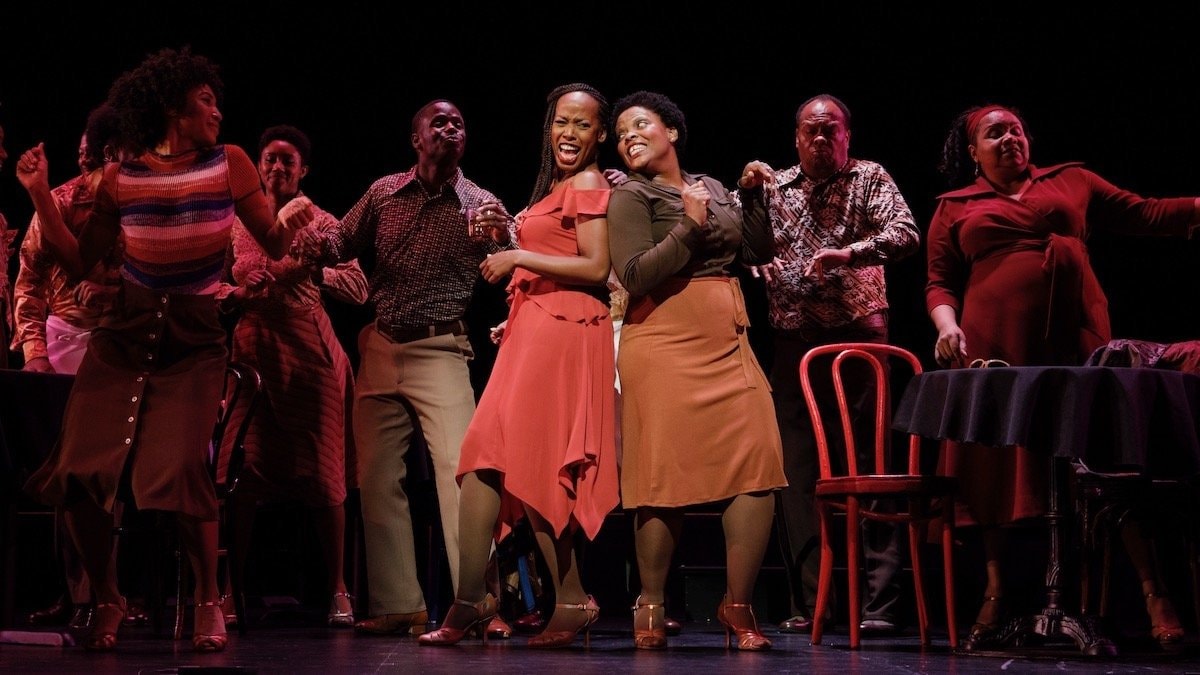
Mr. Burns – a post-electric play (US/UK), Anne Washburn’s imaginative dark comedy, premiered off-Broadway at Playwrights Horizons on September 15, 2013. Washburn’s brilliant play, with music by composer Michael Friedman, explores how the pop culture of one era might evolve into the mythology of another. After the collapse of civilization, a group of survivors share a campfire and begin to piece together the plot of The Simpsons episode “Cape Feare” entirely from memory. Seven years later, this and other snippets of pop culture (sitcom plots, commercials, jingles and pop songs) have become the live entertainment of a post-apocalyptic society sincerely trying to hold onto its past. Seventy-five years later, these are the myths and legends from which new forms of performance are created.
Ten years after the play’s auspicious opening, we caught up with the playwright to discuss The Simpsons, humor, fear, community and the power of storytelling.
In the introduction to Mr. Burns – a post-electric play, you explain that in 2008, you were commissioned by the Civilians, an investigative theatre group based in NYC, to work on an idea you’d been wondering about for years: What would happen to a pop culture narrative pushed past the fall of civilization? What made you choose The Simpsons as your narrative?
I don’t remember it being a very deliberate choice; I knew it should be funny, that people would need a laugh or two, after the fall of civilization, and that the show should be popular and familiar; I loosely considered a number of other sitcoms: Friends, Seinfeld, Cheers, all of which were in brisk syndication at the time. I think I finally decided The Simpsons had been around the longest? Or had the widest cultural reach? It didn’t occur to me that of all those choices, it’s the only one which is about a family, and a community, which I think would make it especially appealing for a post-apocalypse audience, many of whom will have lost family, community.
Though there is a great deal of humor in Mr. Burns, the play is also rife with tension – the characters face potential danger at every turn. You chose “Cape Feare,” a darkly comic episode, as the Simpsons episode they remember best. Do you see a connection between humor and fear?
I actually didn’t choose “Cape Feare” – I did a workshop with actors in which I asked them to remember Simpsons episodes as best they could – I wanted to capture that particular language and thought process we have around remembering something – and I knew I’d use whichever episode they best remembered as a starting point.
But that Simpsons episode is brilliantly right for this – it’s a grim, deep old story of family versus chaos, really primitive and hard, and making it hilarious is awful and wonderful and opens up a lot of possibilities. I think of humor and fear as being quite doubled, generally.
“The Simpsons is about a family, and a community, which I think would make it especially appealing for a post-apocalypse audience, many of whom will have lost family, community.”
The characters in Mr. Burns turn to stories to connect, make sense of their world, and even to survive. Do you believe that storytelling is fundamental to survival?
I think it’s inevitable; at our worst, we’ll always tell stories of blame; we’re at our best and most powerful I think when we can laugh at ourselves – as individuals, or groups – but we’re always going to be telling stories, and it’s better if they have shape and a complexity. I know we don’t seem to be able to know ourselves without first losing ourselves in a narrative.
The play addresses several types of media. People tell stories around a campfire, and they recount an episode of television. Later, they recreate commercials and sing pop songs. The three acts move from naturalism to presentational theatre to a new form of opera. What made you choose the medium you explore in each act?
I knew I wanted the last act to be enormous and I kind of thought of it as theatre created by people who don’t have the habit of holding back, artistically. I wanted it to have everything. I think of the “show” in the second act as nostalgia porn – they’re very exact in what they’re recreating and that exactness – making sure it’s “authentic” to what it was in the Beforetime seems to be very important to that audience; the commercials are at once very comforting – full of long lost goods and services – and also the place where they’re starting to experiment with form, with using a familiar form to just barely begin to hint at the enormous loss and threat they can’t afford to actually articulate. And then sitting around a campfire telling a story… bringing everyone into the same imaginary narrative… adjusting our mental worlds and our nervous systems to each other… it’s the oldest form of community building we have, right?
“We’re at our best and most powerful when we can laugh at ourselves… but we’re always going to be telling stories, and it’s better if they have shape and a complexity.”
You collaborated with composer Michael Friedman, who tragically died at age 41 in 2017. Can you talk a bit about your creative process with Michael?
I would write lyrics, he would write music, and then… and then honestly it’s a bit of a blur – after the first draft I did a number of moderate rewrites on the first and second act, but that third act underwent so much thinking and so many revisions, most of them at high speed and under great pressure, and I don’t think I could tell you at this point what was me and what was Michael. I will say that he was quite a brilliant dramaturg, in that he was a past master at asking a small, simple, seemingly not-directed question… which would spark all sorts of ideas and which probably took you to the place he had in mind all along, but it felt like your own process.
I’ve never quite felt I had the musical sophistication to really understand what Michael was doing with that score, but I know the brief we were both working with, in that act, was a kind of amalgam of high irony and raw sincerity, plus high drama. We wanted the 21st-century audience to have their experience of that act, while also having access to the experience of the 22nd-century audience.
In her review of the 2022 Hudson Valley Shakespeare Festival production of Mr. Burns – a post-electric play, Alexis Soloski of The New York Times called the work “timely” and asked, “Will there always be some new disaster? Will this play always seem of the moment? Yes. Probably.” She also said of the play, “In its invention, its cool ruthlessness, its interrogation of why and how we use narrative, it has not aged at all.” Do you agree, or would you write something different if you began writing the play today?
If I were writing it now, I’d probably be thinking more about long-form narrative – what if civilization fell before the last season of Game of Thrones, for example; people would be revisiting the story to complete it. When we spend so much time with characters, we feel more ownership of them. I imagine I’d be thinking more about Breaking Bad’s Walt and Jesse and their New Adventures… and I don’t know, at all, if any of that would make it a very different play, or if it would be at heart the same play told in a rather different way.
As far as its relevance for now… I’m probably the last person to be able to understand or articulate that, unfortunately!
In the licensed script, you provide guidance for directors presenting Mr. Burns, though you stress that your suggestions are meant to be “illuminating rather than prescriptive.” In brief, what is your advice to theatre companies looking to stage the play?
I think the trickiest thing about staging it is that there are many situations in the play which feel familiar, for theatremakers in particular: a group of people sitting around trying to remember stories from a Simpsons episode, a group of people trying to put on a show… and it’s both difficult and important to remember that although the activity looks familiar, the actual stakes are quite different; the group of people laughing about The Simpsons are desperately trying to not think about a host of difficulties your average 21st-century person doesn’t partake of; if your rehearsal falls apart and your group disbands, you will still have shelter and food and companionship.
In 2023 and beyond, what do you hope audiences will take away from the show?
I hope they are often absorbed, and occasionally amused.
To license a production of Mr. Burns – a post electric play, visit Concord Theatricals in the US or UK.
Header image: 2013 Playwrights Horizons production of Mr. Burns, a post-electric play (Joan Marcus)

Recommended Shows for Drama Festivals

The Truth Behind… The Normal Heart

